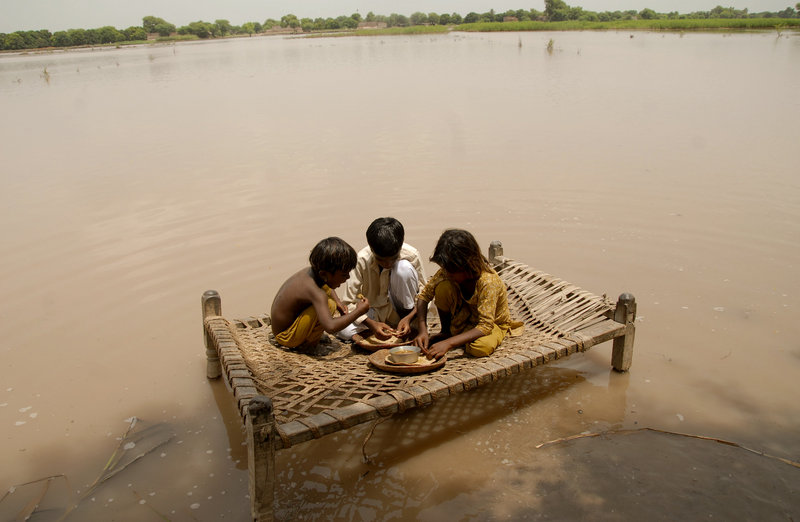NOWSHERA, Pakistan – The death toll in the massive flooding in Pakistan surged past 800 as floodwaters receded Saturday in the hard-hit northwest, an official said.
The damage to roads, bridges and communications networks hindered rescuers, while the threat of disease loomed as some evacuees arrived in camps with fever, diarrhea and skin problems.
Even for a country used to tragedy — especially deadly suicide attacks by Taliban militants — the scale of this past week’s flooding has been shocking. Monsoon rains come every year, but rarely with such fury. The devastation came in the wake of the worst-ever plane crash in Pakistan, which killed 152 people in Islamabad on Wednesday.
In neighboring eastern Afghanistan, floods killed 64 people and injured 61 others in the past week, while destroying hundreds of homes and huge stretches of farmland, according to Matin Edrak, director of the Afghan government’s disaster department.
As rivers swelled in Pakistan’s northwest, people sought ever-shrinking high ground or grasped for trees and fences to avoid getting swept away. Buildings simply crumbled into the raging river in Kalam, a town in the northern part of the Swat Valley, Geo TV showed Saturday.
Reports coming in from districts around the northwest, where such flooding has not been seen since 1929, showed at least 800 people had died, said Mian Iftikhar Hussain, the region’s information minister.
Floodwaters were receding in the region, and many people remain missing, Hussain said.
More than 30,000 Pakistani army troops engaged in rescue and relief work had evacuated 19,000 trapped people by Saturday night, said army spokesman Maj. Gen. Athar Abbas.
“The level of devastation is so widespread, so large,” he said. “It is quite possible that in many areas there is damage, deaths, which may not have been reported.”
In the Nowshera area, scores of men, women and children sat on roofs in hopes of air or boat rescues. Many had little more than the clothes on their backs.
A doctor treating evacuees at a small relief camp in Nowshera said some had diarrhea and others had marks appearing on their skin, causing itching. Children and the elderly seemed to have the most problems, Mehmood Jaa said.
“Due to the floodwater, they now have pain in their bodies and they are suffering from fever and cough,” Jaa told The Associated Press.
In the town Charsadda, Nabi Gul, who estimated he was around 70, looked at a pile of rubble where his house once stood.
“I built this house with my life’s earnings and hard work, and the river has washed it away,” he said in a trembling voice. “Now I wonder, will I be able to rebuild it? And in this time, when there are such great price hikes?”
Another resident of Charsadda complained of what he considered a lackluster government response.
“Nobody has offered us for help. We have got no help,” said Awal Sher, 60. “Everything is destroyed. Inside, outside — everything is broken.”
Copy the Story Link
Send questions/comments to the editors.



Success. Please wait for the page to reload. If the page does not reload within 5 seconds, please refresh the page.
Enter your email and password to access comments.
Hi, to comment on stories you must . This profile is in addition to your subscription and website login.
Already have a commenting profile? .
Invalid username/password.
Please check your email to confirm and complete your registration.
Only subscribers are eligible to post comments. Please subscribe or login first for digital access. Here’s why.
Use the form below to reset your password. When you've submitted your account email, we will send an email with a reset code.